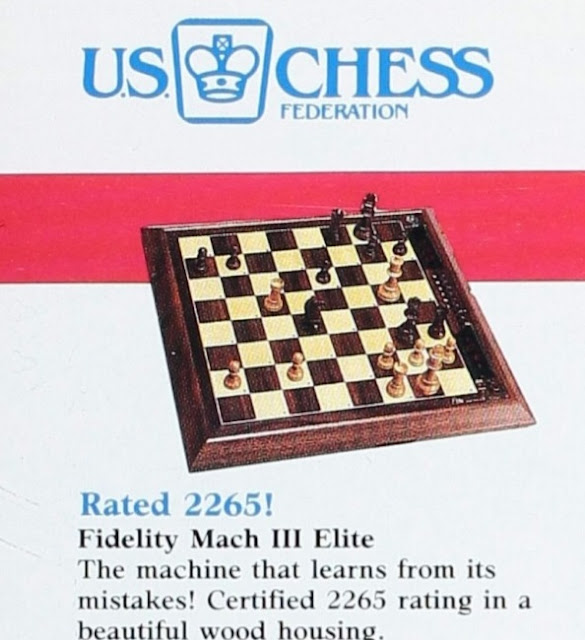"On the Chess-board lie and hypocrisy do not survive long." Lasker’s Manual of Chess by E. Lasker (New York, 1927), page 262. "Computers are incredibly fast, accurate and stupid; humans are incredibly slow, inaccurate and brilliant; together they are powerful beyond imagination." -- Albert Einstein
domingo, 30 de agosto de 2020
sábado, 29 de agosto de 2020
quinta-feira, 27 de agosto de 2020
quarta-feira, 26 de agosto de 2020
domingo, 23 de agosto de 2020
Galjoen 0.37.2 x Novag Emerald
sábado, 22 de agosto de 2020
quinta-feira, 20 de agosto de 2020
Qual o modelo do Super Expert
Recentemente li um artigo no fórum Hiarcs questionando sobre a versão do modelo do Super Expert. Interessante a resposta:
"existe uma maneira fácil e confiável de descobrir que versão é: Com os níveis de seletividade ...
Primeiro você deve reiniciar o SE (com o botão na parte inferior; você certamente sabe, como fazer isso)
Se você pressionar " definir nível "e você verá" nível xx sel 5 ", então é um" C "(tem 7 níveis de seletividade; pode ser alterado com as teclas de seta); se for "nível xx sel 3", então é um "B" (5 níveis de seletividade)
E se você vir apenas "nível xx", então você realmente tem um "A". A seletividade desta versão só pode ser ligada ou desligada (se bem me lembro com o campo "h8" no modo de configuração de nível)."
Ainda, verificar os modelos disponíveis, a saber:
A é 878
B é 887
C é 902
quarta-feira, 19 de agosto de 2020
segunda-feira, 17 de agosto de 2020
Chess Life - março de 1980 - interessante para ler e opinar
The debate between Harold B. Dondis and David Levy in the September Chess Life & Review [" Does the -computer violate the laws of chess'?") is of interest not for what they debated but for what they left o,ut: the real issue. The real issue is that the continued development of computer chess , is liable to seriously diminish or destroy the game. It will destroy both its prestige, with consequent loss of public interest and investment, as well as appreciation of its beauty, its unique melding of human logic, creativity, esthetics and competitive spirit. Dondis may well write, as he does, "... the computer can always'be barred later, after its pre: dominance becomes clear." By then, it will be too late. By then, chess will no longer be chess. It will be glorified tic-tac-toe. One must agree with Levy—the program that defeats Karpov will use advanced and subtle strategy to decrease the number of possible positions that must be analyzed. Since there is no reason, in principle, why such a program could not be developed, we can be confident that it will come into being sooner or later. What will be the consequences of this unbeatable chess computer'? For the chessplayer, serious or professional, there will be no more original opening theory, nor indeed original chess theory at all. Specifically, there will be no innovation, no trends, no philosophizing, no surprises. All will be known. Chess will be left with the intellectual appeal of Newton's two-body problem. The computer may well produce games of eerie beauty, stunning moves; but it will all be dead. Chess is appealing to chessplayers and the public because, when played beautifully, it is a human achievement—Chernev might even say, an art form. If a computer, and not Rubinstein, had printed out QB1 in the famous Rubinstein-Capablanca encounter of some SO years ago, who would care? Essential to the beauty of that move was the fact that Rubinstein thought of it Iinsis.t that Q-B1, made by Rubinstein, is beautiful; made by a computer, is dead. This is not a matter for debate; it simply acknowledges psychological reality.
domingo, 16 de agosto de 2020
sábado, 15 de agosto de 2020
terça-feira, 11 de agosto de 2020
Gavon
Pi rev2 ARM1176JZF-S 700Mhz-512MB




































